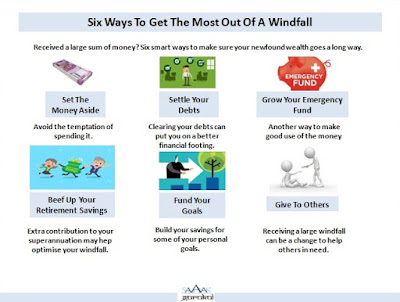Figuring out how to manage a windfall sounds like the kind of problem we’d all like to have.
Sadly, though, an unexpected payout—whether from an inheritance, a lawsuit settlement or a lucky lottery ticket—can create a world of problems. Shady advisers may shower you with dubious money multiplying schemes. Long-lost relatives could reappear with hard-luck stories. You might be tempted to quit your job, buy a more expensive house or make other costly decisions that could make your jackpot disappear as soon as it appeared.
A windfall can fulfill aspirations and eliminate financial distress. However, it can also throw up unforeseen challenges, which call for deft financial manoeuvring
Most of us dream of striking it rich with a financial windfall like winning the lottery, encashing an ESOP, getting a family inheritance, or inking a big business deal — and some people’s fortunes really do change overnight.
According to a study by Accenture, between $1 trillion and $3 trillion will be transferred to heirs every year through 2050.
The lump sum amount received on retirement from PF, Gratuity, superannuation and other retirement benefits is also like a windfall and needs proper handling and investment strategy.
Whatever the circumstances that give rise to a source of newfound wealth, it’s more important than ever to make sound financial decisions and avoid some pitfalls. Far more people have received money and blown it away than people who have never made any money. The problem is not making or getting money but how to handle it, once you have it. The problem is not on how to create wealth but in maintaining and growing wealth.
You might suddenly find you have an urge to splurge, have friends seeking handouts or find yourself a magnet for fraudsters — any of which can lead to a money blunder. Just ask the numerous lottery winners who squandered their riches and ended up broke.
An estimated 70 percent of people who receive a financial windfall — a large amount of sudden money — won’t have any left within a matter of a few years.
Everyone rejoiced at the phenomenal success of Sushil Kumar, a computer operator from Motihari in Bihar, who went on to win ₹5 crore on the hot seat in KBC season 5, becoming the first contestant in the show’s history to win such a huge sum. Coming from a humble background, Kumar’s win was celebrated by everyone. The money gave him name and fame. But apparently he didn’t invest it wisely. According to the reports, he received a sum of ₹6 crores after the deduction of taxes. He spent it on building a house, buying farmland in his village, and establishing his kin and family. Currently, he is reportedly jobless and struggling for money.
Similarly, Sunmeet Kaur’s story is that of hard work and hope. Despite a degree in fashion designing, she was not allowed to pursue a career in designing by her in-laws. But she did not give up on her dreams and started a tiffin service centre. Unfortunately, her business flopped following an accident that left her bed-ridden for six months. Thereafter, she started to take tuitions for children, and the knowledge gained led her to win ₹5 crore in KBC, season 6.
She also made some ill advised investment decisions and the last we heard of her was that she had started a fashion house with a friend, of which she is no longer a partner.
You need to deal with the human side of money first before the technical part; the sudden wealth can also leave you stressed and unsure how to handle the cash.
Most of the mistakes when people inherit money happen when they put the money to use too quickly. It is advisable to first, hit the pause button, it’s important to have a cooling off period of six to 12 months before taking any action. During that time, it may pay to park the newfound money in a relatively safe investment, such as a Government Bond or a short term fund.
Having savings is the foundationupon which financial prosperity is built. So if you don’t have a financial buffer or emergency fund, the best way to spend your sudden cash, is not to!
Better budgeting: You start with 10% less, and so you immediately start budgeting,
Freedom from materialism: You just proved to yourself that money and the things that money can buy aren’t that important.
Increased happiness: According to social scientists, giving brings more happiness than receiving.
So, spend a part of your windfall to Make a difference.
While it’s nice to be charitable, use your judgment when friends and relatives come calling.
If you don’t feel right making a loan, remember that you can offer to help loved ones in other ways. But it’s not necessary to make lengthy excuses or feel guilty. In the long run, your loved ones might be better off if you don’t give them a handout you can’t afford.
“If you are too generous, you may have to come back to them for help,”
Protect your money from scammers.
A windfall — particularly one that others can find out about, such as some inheritances or a lottery win — can make you a target for fraudsters, so keep your guard up.
In addition to researching professionals and potential investments, you should brush up on the different types of fraud, how fraud happens, and learn the warning signs of fraud.
Red flags include promises of quick profits, “guaranteed” returns or pressure to spend money right away.
Another popular theory on how to handle a windfall is to
Try The 50/50 (25/15/10) Plan
Take 50%, and put it towards investments and savings.
Take 25% & repay your Debt and if you don’t have Debt, use it for creating a passive income
Put 15% in something you want guilt-free. Reward yourself. Splurge, go for a holiday, buy that fancy car.
Give 10% Of It Away to charity or create an endowment fund from which to donate regularly.
Make the most of a windfall, consult a credible financial and investment advisor and follow these do’s and don’ts to best manage your windfall. Things to be kept in mind while following the rules are
Liquidity
Returns to beat inflation post taxes
Evaluate against financial goals
Create a passive income
Do’s
Park your winnings in a liquid fund or FD till you work out a long-term financial plan
Review your goals, and put in place an asset allocation strategy to achieve them
Create an emergency fund equal to your family’s six months’ expenses
Evaluate your insurance requirements and enhance cover accordingly
Pay off high-cost debts like credit card dues and personal loans
Don’t
Fall prey to investment schemes that promise stellar returns
Give in to requests for help without verifying details and requirement
Splurge on expensive cars, gadgets or holidays before providing for important goals
Invest in a host of investment cum-insurance plans
Invest in illiquid real estate assets
Make four lists of possible expenditures, under the following categories:
Safety(medical expenses, insurance, home repair, personal transportation, etc.)
Fun(vacations, dinners, travel etc.)
Future(investing; i.e., money left untouched for at least five years.)
Cushion(cash for true emergencies.)
Another, optional category could be charity.
Examine Your Financials
First, make sure you have an emergency fund of three to six months’ expenses in the bank. Then look at debts like credit cards, cars, student loans, etc., and knock them out. People forget or don’t realize that paying off debt equals investing. While it’s not a direct investment, you’ll see gains in your cash flow, therefore increasing net worth.
Once you’ve got those two covered, consider your investment goals, time horizon, taxation, and liquidity needs to determine the right investment vehicle and strategy
Invest in your future.
Make a list of your financial goals and estimate how much each will cost. Want to go on a fabulous vacation? Pay off “past due” bills? Get a degree? Buy a house? Save for a child’s education? Write it all down. Make sure you don’t forget about something that might seem too obvious to include, like your retirement.
If you don’t have a retirement account, consider setting one up. Then, separate your goals into categories — short, medium and long-term — and set up savings and investment accounts for each one. It’s easy to think you’re saving enough money, but keeping separate accounts allows you to keep track of exactly how close you are to achieving each goal.
Classify your needs according to these classifications; Essentials vs Luxuries vs Legacy vs Charity
Invest on self improvement
Investing isn’t limited to your retirement; you can also use some of the windfall toward self-development. Go back to school, hire a career coach, travel or learn a new skill.
According to research on money and happiness, you are more likely to be satisfied with experiences rather than purchases.We tend to adapt to material purchases, which tends to provide temporary satisfaction, while experiences can meet greater psychological needs and provide more lasting satisfaction
Create cash flow : Think of income, not of assets
Unless you have more income than you know what to do with already, creating cash flow is an excellent idea. By putting your money to work for you, you’ll have more money in the future, and more choices of how to spend them! Create a passive income, buy an asset which gives regular returns like rent etc. Apart from Essentials everything else has to be derived from regular Income and not from the corpus.
Tithing : Give 10% Of It Away
What are you truly passionate about? Maybe it’s supporting your faith, doing something for girl child education, creating a trust for cancer patients, solving world hunger, or caring for animals that were mistreated. A windfall is a fantastic opportunity to put your money where your values are.
The simplest way to do this is to make a donation. Even more impactful ways to make a difference could include making a sustainable donation or an endowment(creating cash flow through an income producing asset, then donating the income stream), and/or creating a legacy by including one or more charities as a beneficiary.
When you give away 10% of your money, it results in the following.

Enjoy your windfall and have a great future.
Happy Investing!
Stay Blessed Forever!
Sandeep Sahni





